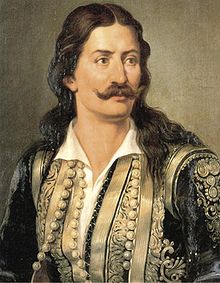Athanasios Diakos
| Athanasios Diakos Αθανάσιος Διάκος |
|
|---|---|

Portrait by Dionysios Tsokos
|
|
| Birth name | Athanasios Nikolaos Massavetas Αθανάσιος Νικόλαος Μασσαβέτας |
| Nickname(s) | Diakos (Deacon) |
| Born | 1788 Ano Mousounitsa or Artotina, Phocis |
| Died |
(aged 32–33) Lamia, Phthiotis |
| Allegiance |
|
| Years of service | 1821 |
| Rank | General (Hellenic Army) (posthumously) |
| Wars | Greek War of Independence |
| Memorials | Athanasios Diakos |
Athanasios Diakos (Greek: Αθανάσιος Διάκος : 1788 – 24 April 1821) was a Greek military commander during the Greek War of Independence, considered a venerable national hero in Greece.
Athanasios Diakos was born Athanasios Nikolaos Massavetas in Phocis, in the village of Ano Mousounitsa, or according to other sources in nearby Artotina. The grandson of a local outlaw, or klepht, he was drawn to religion from an early age and was sent away by his parents to the Monastery of St. John The Baptist (Greek: Αγίου Ιωάννου Προδρόμου), near Artotina, for his education. He became a monk at the age of seventeen and, due to his devotion to his faith and good temperament, was ordained a Greek Orthodox deacon not long afterwards.
Popular tradition has it that while at the monastery, an Ottoman Pasha visited with his troops and was impressed by Athanasios's good looks. The young Athanasios took offence to the Turk's remarks (and subsequent proposal) and the ensuing altercation resulted in the death of the Turkish official. Athanasios was forced to flee into the nearby mountains and become a klepht. Soon afterwards he adopted the pseudonym "Diakos", or Deacon.
Diakos served under a number of local klepht leaders in the region of Roumeli, distinguishing himself in various encounters with the Ottomans. He also served for a time as a mercenary in the army of Ali Pasha at Ioannina in Epirus, where he befriended Odysseas Androutsos, another klepht. When Androutsos became the captain of a unit of armatoloi at Livadeia, Diakos served for a time as his protopallikaro (literally "first warrior", or lieutenant). In the years leading up to the Greek War of Independence, Diakos had formed his own band of klephtes and, like many other klepht and armatoloi captains, he had become a member of the Filiki Eteria.
...
Wikipedia
